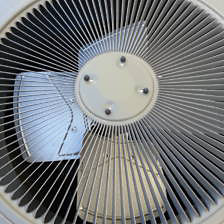Single vs Two-Stage vs. Variable-Speed ACs for Denver Homes
If you’re in the market for a new air conditioner, you’ve probably noticed terminology like single-stage, 2-stage and variable speed air conditioners.
So, which one is best for your Denver home?
Well, here’s our professional suggestion:
- Variable-speed AC: the best option
- Two-stage AC: a good option
- Single-stage AC: the least ideal option
You see, a variable-speed AC is the most ideal option for both comfort and efficiency. However, if your budget doesn’t allow for the higher upfront cost of a variable-speed AC, we highly recommend choosing a two-stage AC over a single-stage.
To help explain our recommendation, we’ll go over how each system works and point out the pros and cons of each.
Single-stage air conditioners
How it works:
Single-stage air conditioners are the most traditional AC system on the market. And if your home is older than 10 years old, you most likely have a single-stage air conditioner. These systems have just one compressor speed, which means that once it kicks on it runs at full blast.
Pros:
Cost: Single-stage ACs are less expensive upfront than two-stage and variable-speed air conditioners.
Cons:
Lower energy efficiency: Given Denver’s moderate summer climate, it’s likely that around 80% of the time, you won’t need an AC that runs at full blast to cool your home. Which means that you end up paying for more energy usage than you really need.
Think of a single-stage AC as a car that’s driven in short, very fast bursts. It eats up a lot more energy than a car that’s cruising at a steady pace down the interstate, and it’s not the most efficient way to get from point A to point B, right?
Short-cycling: Because they run at full-blast, a single-stage air conditioner will run for very short cycles over and over (called “short-cycling”), it can lead to frequent, expensive repairs and a shorter system life span.
Uneven temperatures: As described above, a single-stage air conditioner cools your home with very short but strong blasts of cool air. And this can lead to very uneven temperatures throughout the home. If you have a multi-level home, we especially don’t recommend investing in a single-stage AC as uneven temperatures become even more of a problem with upstairs rooms.
Two-stage air conditioners
How it works:
Two-stage air conditioners have compressors that can run at 2 speeds: high and low. So, during mild summer days (such as the majority of Denver’s summer days), your AC will only run at a steady, low pace to cool your home. But on very hot days it can also ramp up to full blast speed to keep you comfortable. Usually the “low” speed operates at 60-70% of the high speed.
Pros:
Efficiency: Let’s go back to our car analogy. A car that’s driving at a steady pace eats less gas than a car that’s driving very fast but constantly stopping and starting. And that’s how a two-stage AC works. Eighty percent of the time, the system relies on the low speed to cool your home which means less energy is used.
Even temperatures: A slow, steady push of cool air means you benefit from even temperatures throughout your home.
Longer, quieter cycles: Running at 70% of its full capacity allows a two-stage air conditioner to operate much quieter than a single-stage AC.
Cons:
Cost: Two-stage ACs cost more than single-stage ACs. On average, two-stage systems can cost more than a single-stage, but the upside is that they can save you money on monthly energy bills.
Variable-speed air conditioners
How it works:
Unlike a two-stage unit, which only has 2 levels of cooling, a variable-speed unit can alter its cooling capacity gradually, as much as 35% of its total capacity.
Pros:
Most comfortable of all options: Variable-speed ACs offer only the exact amount of cooling your home needs at any time. For example, on very hot days, a variable air conditioner can ramp up its capacity to whatever might be needed to cool down your home quickly (let’s say it uses 60% of its capacity). But once your home cools down, it automatically switches to a lower capacity to keep your home right at your desired temperature.
Most efficient: Because they can ramp down to 35% of its capacity, variable-speed ACs save you a lot of money, especially in climates that get moderately warm, like Denver.
Think of it this way: Why pay extra to have your AC run at 100% capacity when it could get the job done by working at 35% capacity?
Cons:
Cost: Variable-speed ACs typically have a higher upfront cost than both a two-stage or single-stage AC. However, variable-speed ACs provide the highest monthly energy savings compared to both single-stage and two-stage ACs.
Need help from a Colorado Plumbing, Heating, Cooling, or Electrical Specialist?
For your convenience, you can request an appointment in one of two ways:
- Call us at (303) 436-2525 for immediate assistance.
- Click on the button below to schedule your appointment online.
Related Reading
Join Our Email Newsletter
Receive updates, current news, promotions, and industry tips.

